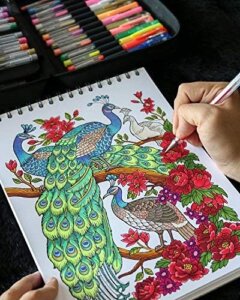They’re creepy, crawly, and make us shiver ever time we even think about them. But why do we have such a negative reaction toward bugs? Experts believe our fear is rooted within our evolution.
Even though they’re much smaller than we are, certain bugs can be deadly. Some carry diseases, like Zika- and West Nile-carrying mosquitos. Others, like black widow spiders, have venomous bites. Per National Geographic, a 2001 study — in which participants were asked to pick out dangerous species within a series of photos — revealed that people are more likely to notice insects and snakes as potential dangers than anything else.
The study’s co-author, Arne Öhman, a psychologist at the Karolinska Institute and Hospital in Stockholm, Sweden, believed that his findings show that humans have evolved to fear small critters that once harmed our ancestors. “Evolution has equipped mammals with a readiness to easily associate fear to recurrent threats in their evolution,” he told National Geographic. “Thus, given that fear is activated when a snake is around, they condition fear to the snake much easier than to other stimuli that are around.”
It’s for this same evolutionary reason that humans show physical disgust toward bugs. University of Pennsylvania psychology professor Paul Rozin studied and wrote about disgust origins and our rejection response, that being the need to distance ourselves from something gross ASAP.
[fm_giphy url=”https://media.giphy.com/media/11GLfCXU8gLB1C/giphy.gif”]
“Disgust evolves culturally,” Rozin explained in a 1997 interview, “and develops from a system to protect the body from harm to a system to protect the soul from harm.”
Both evolution and society have formed our minds to believe insects are dangerous, and are therefore critters we should avoid. Any negative response you have to seeing a bug is an evolutionary and culturally-motivated response.
Jeffrey Lockwood, insect ecologist and author of the book The Infested Mind: Why Humans Fear, Loathe, and Love Insects, noted via a 2013 interview with Popular Science that besides our evolutionary dislike of bugs, our interactions with them are usually negative, thus strengthening our hatred for them.
[fm_giphy url=”https://media.giphy.com/media/xTiTnGuHmcaQeWSryE/giphy.gif”]
“In the modern world, we have very little experience with positive encounters with insects,” Lockwood said. “Culture overlays our evolutionary tendencies. You could think of our fear and disgust of insects of being as a conspiracy of evolution and culture. And that is the state of the human mind at this point in our history.”
He goes on to mention that we often see bugs as invaders of our private space and liken them to uncleanliness and poor hygiene. Most of us have yet to have good experiences with insects, which only bolsters our negative opinions of them.
It’s not necessarily bugs’ fault that we hate them so much. Our dislike of them is simply part of our human nature.





